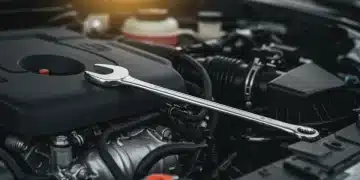Car Buying Guide 2025: Extended Warranties & Service Contracts

Car Buying Guide 2025: Deciphering the Fine Print of Extended Warranties and Service Contracts is essential for navigating the complexities of vehicle protection plans, ensuring buyers understand coverage, exclusions, and the true value offered alongside their new or used car purchase.
Navigating the car buying process in 2025 requires a keen understanding of the options presented to you at the dealership. Among the most significant are extended warranties and service contracts. This Car Buying Guide 2025: Deciphering the Fine Print of Extended Warranties and Service Contracts will help you make informed decisions.
Understanding Extended Warranties and Service Contracts
When purchasing a new or used vehicle, buyers are often presented with options for extended warranties and service contracts. These plans promise to provide peace of mind by covering potential repair costs beyond the manufacturer’s original warranty. Understanding the nuances of these offerings is crucial to making an informed decision.
Extended warranties and service contracts can be complex. While they both aim to provide financial protection against unexpected repairs, they differ in several key aspects. Knowing these differences will help you determine whether either option is right for your specific needs and circumstances.
What is an Extended Warranty?
An extended warranty, also known as a vehicle service contract, is essentially an extension of the manufacturer’s original warranty. It covers repairs or replacements of specific components of your vehicle for a specified period or mileage after the original warranty expires.
What is a Service Contract?
A service contract is an agreement between you and a provider (which could be the dealership or a third-party company) to cover certain repairs or maintenance services on your vehicle. Unlike an extended warranty, a service contract may also include routine maintenance services like oil changes and tire rotations.

- Coverage: Extended warranties typically cover mechanical breakdowns, while service contracts can include maintenance.
- Provider: Extended warranties are often backed by the manufacturer, while service contracts can be from third parties.
- Cost: The cost of each can vary widely depending on the vehicle, coverage, and provider.
Understanding the differences between extended warranties and service contracts is the first step in determining whether these options provide real value or are simply an added expense. Carefully consider your vehicle’s history, your driving habits, and your financial situation when making this decision.
Key Considerations Before Purchasing
Before you sign on the dotted line for an extended warranty or service contract, there are several critical considerations to keep in mind. These factors can help you assess the true value of the plan and determine whether it genuinely aligns with your needs.
Failing to properly evaluate your needs and understand the terms of the contract can lead to financial disappointment. Make sure you conduct thorough research and ask the right questions before making a commitment.
Assessing Your Needs
Start by evaluating your driving habits, the reliability of your vehicle, and your financial situation. If you drive a lot of miles or own a vehicle known for frequent repairs, an extended warranty or service contract might be worth considering. However, if you have a reliable car and a healthy savings account, you might be better off self-insuring for potential repairs.
Reading the Fine Print
Always read the fine print of any extended warranty or service contract before purchasing it. Pay close attention to what is covered, what is not covered, and any exclusions or limitations. Understanding the specific terms and conditions will help you avoid surprises down the road.
- Deductibles: How much will you have to pay out-of-pocket before coverage kicks in?
- Exclusions: What specific parts or repairs are not covered by the plan?
- Transferability: Can you transfer the warranty or service contract if you sell the vehicle?
Consider the reputation of the warranty provider. Research customer reviews and ratings to gauge their reliability and customer service quality. A reputable provider is more likely to honor claims fairly and provide a positive experience.
Careful evaluation and thorough research are essential before purchasing an extended warranty or service contract. Taking the time to understand the terms and conditions and assess the provider’s reputation can save you from potential headaches and financial strain in the future.
Navigating Coverage and Exclusions
Understanding the details of what is covered, and perhaps more importantly, what is not, is paramount when evaluating extended warranties and service contracts. This knowledge will help you determine the true value of the plan and avoid unexpected out-of-pocket expenses.
Many vehicle owners are surprised to learn that their extended warranty or service contract doesn’t cover certain repairs. This often leads to frustration and dissatisfaction. Understanding the scope of coverage upfront is essential.

Common Coverage Areas
Extended warranties and service contracts typically cover major mechanical components like the engine, transmission, and drivetrain. Some plans may also include coverage for electrical systems, air conditioning, and other components. However, it’s crucial to verify exactly what is covered under your specific plan.
Typical Exclusions
Most extended warranties and service contracts have exclusions. Common exclusions include wear-and-tear items like brake pads, tires, and wiper blades. They may also exclude damage caused by accidents, misuse, or lack of maintenance. Understanding these exclusions is crucial to avoiding disappointment.
- Wear-and-Tear: Components that degrade over time are often excluded.
- Accidental Damage: Damage caused by collisions or other accidents is rarely covered.
- Lack of Maintenance: Failure to follow the manufacturer’s recommended maintenance schedule can void coverage.
Familiarize yourself with the claims process. Understand how to file a claim, what documentation is required, and what to expect during the repair process. This knowledge will help you navigate the process smoothly and efficiently should the need arise.
A clear understanding of coverage and exclusions is essential for making an informed decision about extended warranties and service contracts. Don’t hesitate to ask questions and clarify any uncertainties before purchasing a plan. This proactive approach can save you from potential frustration and financial surprises in the future.
Comparing Plans and Providers
Not all extended warranties and service contracts are created equal. Comparing different plans and providers is essential to finding the best value and coverage for your specific needs. This process involves evaluating factors like coverage, cost, deductibles, and provider reputation.
Rushing into a decision without comparing options can lead to overpaying for inadequate coverage. Taking the time to shop around and compare different plans can save you money and ensure you get the protection you need.
Evaluating Coverage Options
Start by comparing the coverage options offered by different plans. Some plans offer comprehensive coverage for nearly all mechanical components, while others offer limited coverage for specific parts. Determine which components are most important to you and prioritize plans that offer robust coverage in those areas.
Assessing Costs and Deductibles
Compare the costs of different plans and consider the deductibles. Lower deductibles typically mean higher premiums, while higher deductibles mean lower premiums. Choose a plan with a deductible that you can comfortably afford in the event of a repair.
- Premiums: The monthly or annual cost of the plan.
- Deductibles: The amount you pay out-of-pocket before coverage kicks in.
- Payment Plans: Some providers offer flexible payment plans to make the cost more manageable.
Research the reputation of different providers. Look for providers with a track record of excellent customer service and fair claims processing. Reading customer reviews and checking ratings with organizations like the Better Business Bureau can provide insights into a provider’s reliability.
Comparing plans and providers is a crucial step in the process of purchasing an extended warranty or service contract. By carefully evaluating coverage options, costs, deductibles, and provider reputation, you can find the plan that best meets your needs and provides the peace of mind you’re looking for.
Negotiating Prices and Terms
The price and terms of extended warranties and service contracts are often negotiable. Don’t be afraid to haggle for a better price or negotiate more favorable terms. Dealerships and providers are often willing to negotiate to close a sale.
Many car buyers assume that the price and terms of these plans are fixed. However, with a little negotiation, you can often save money and get better coverage. Knowledge is power, and a willingness to negotiate can pay off.
Researching Market Value
Before you start negotiating, research the market value of similar plans. This will give you a benchmark for determining a fair price. Online resources and consumer reviews can provide valuable insights into the typical costs of extended warranties and service contracts for your vehicle.
Leveraging Competition
Let the dealership or provider know that you’re comparing offers from multiple sources. This can create a sense of competition and encourage them to offer you a better deal. Don’t be afraid to walk away if you’re not satisfied with the offer.
- Multiple Quotes: Get quotes from several providers to compare prices and coverage.
- Negotiation Tactics: Be prepared to negotiate and don’t be afraid to walk away.
- Read the Agreement: Double-check the final agreement to ensure all negotiated terms are included.
Ensure that all negotiated terms are clearly documented in the final agreement. This will protect you from potential misunderstandings or disputes down the road. Review the entire contract carefully before signing to ensure that everything is accurate and complete.
Negotiating prices and terms can significantly impact the value you receive from an extended warranty or service contract. By researching market value, leveraging competition, and documenting all negotiated terms, you can secure a better deal and protect your investment.
Making the Right Decision for You
Ultimately, the decision of whether to purchase an extended warranty or service contract is a personal one. There is no one-size-fits-all answer. The right decision depends on your individual circumstances, driving habits, and risk tolerance.
What works for one car buyer might not work for another. It’s essential to weigh the pros and cons carefully and consider your unique needs and preferences.
Consider Your Vehicle’s Reliability
If you own a vehicle known for its reliability, you might be less inclined to purchase an extended warranty or service contract. However, if you own a vehicle with a history of frequent repairs, the added protection could be worth the investment.
Evaluate Your Financial Situation
Assess your financial situation and determine whether you can comfortably afford the cost of the plan. If the premiums or deductibles would put a strain on your budget, you might be better off self-insuring for potential repairs.
- Risk Tolerance: How comfortable are you with the risk of paying for unexpected repairs out-of-pocket?
- Budgeting: Can you comfortably afford the premiums and deductibles?
- Peace of Mind: How much value do you place on the peace of mind that comes with knowing your vehicle is protected?
Don’t feel pressured to make a decision on the spot. Take your time to research your options, compare plans, and negotiate prices. The right decision is one that you feel confident and comfortable with.
| Key Point | Brief Description |
|---|---|
| 🔎 Research Plans | Compare coverage and providers before deciding. |
| 📜 Read the Fine Print | Understand exactly what’s covered and excluded. |
| 💰 Negotiate | Don’t hesitate to haggle for better prices and terms. |
| 🤔 Assess Your Needs | Match the plan to your driving habits and vehicle reliability. |
FAQ
▼
An extended warranty is an extension of the manufacturer’s warranty, covering mechanical breakdowns. A service contract may also cover routine maintenance like oil changes.
▼
Common exclusions include wear-and-tear items (brakes, tires), accidental damage, and damage from lack of maintenance. Review your specific contract for details.
▼
Yes, often the prices and terms are negotiable. Research market value and be prepared to negotiate for a better deal.
▼
Assess your driving habits, vehicle reliability, and financial situation. Consider your risk tolerance and budget before making a decision.
▼
Both dealerships and third-party companies offer these plans. Compare offers from multiple sources to find the best coverage and price. Check the provider’s reputation.
Conclusion
In the end, carefully evaluating your needs, researching your options, and understanding the fine print will empower you to make an informed decision about extended warranties and service contracts, leading to greater confidence and satisfaction in your car buying experience.





